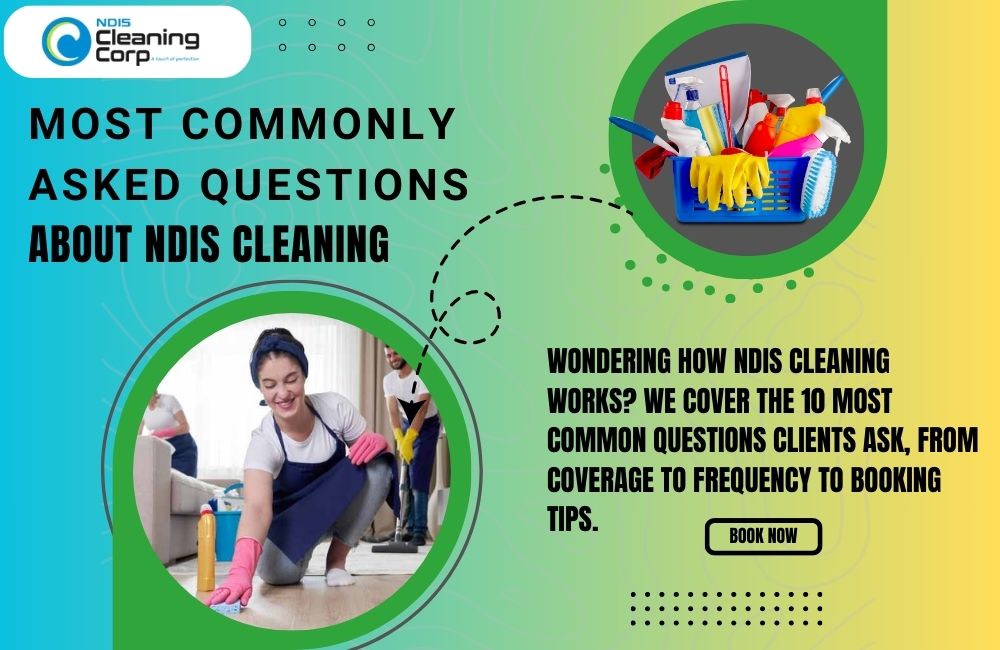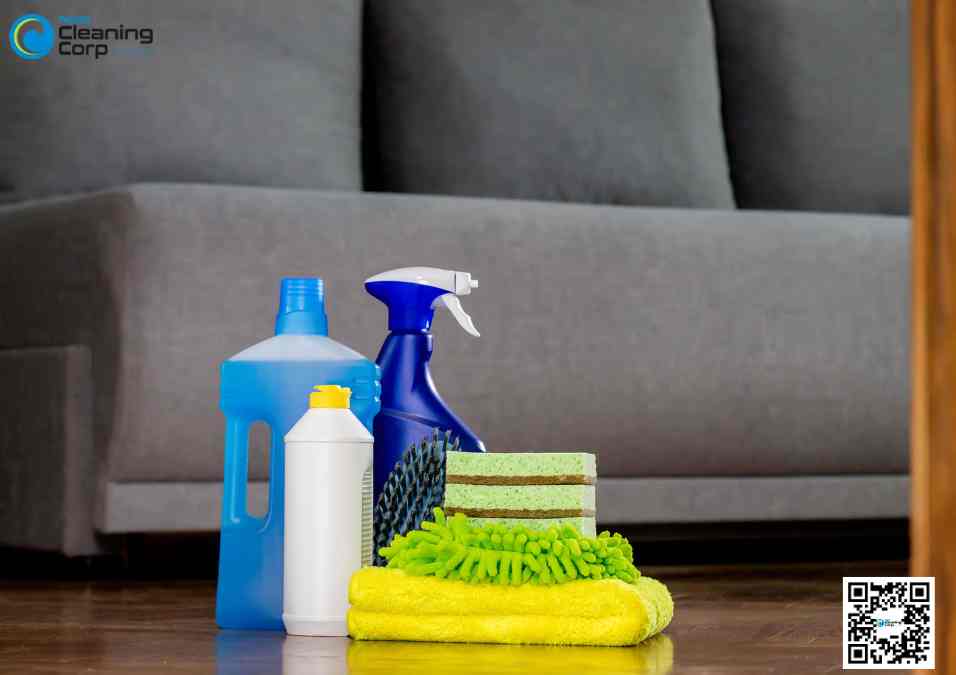Does the NDIS Fund Cleaning Services?
Yes. The NDIS does fund cleaning services — but it...
Hey there! If you’re reading this, chances are you’re looking for ways to make daily living a little easier through the National Disability Insurance Scheme (NDIS). One often-overlooked aspect of living independently is maintaining a clean and tidy home.
A regular cleaning schedule is not just about aesthetics; it’s essential for health, safety, and overall well-being. Imagine coming home after a long day to a fresh, clean space that feels inviting and safe. For many NDIS participants, a clean environment can mean the difference between feeling overwhelmed or feeling relaxed and in control.
Using NDIS funding to establish a regular cleaning routine can truly transform your living situation. It allows you to focus on what matters most—your daily activities and enjoying life—while professionals handle the cleaning. You might be surprised at how manageable things become when you have the right support. And believe me, I’ve seen it work wonders for many friends and clients who’ve embraced this approach.

Let’s break it down a bit. The National Disability Insurance Scheme, or NDIS for short, is an Australian government initiative designed to provide support for people with disabilities. It’s all about helping individuals gain greater independence and access to services that enhance their quality of life. This funding is tailored to meet individual needs, and it can cover various daily living expenses, including cleaning services.
Now, you might be wondering, How does this work in practice? Well, think of NDIS funding as a way to empower yourself to create a living environment that suits your personal needs. This isn’t just about receiving help; it’s about taking charge of your life.
When it comes to daily living, maintaining a clean home is crucial. It can help prevent accidents, reduce the risk of illness, and provide a comforting atmosphere.
With NDIS funding, you can allocate resources specifically for cleaning services. This means you’re not alone in this journey. You can hire professionals who understand your needs and can cater to them effectively.
For instance, I remember chatting with a friend named Sarah, who uses NDIS funding. She had been struggling to keep her home tidy due to mobility challenges. Once she started using her NDIS funding for cleaning, Sarah found not just relief but joy in her space again. She could focus on her hobbies and social interactions instead of stressing over chores.
Now, let’s dive into what types of cleaning services are actually covered by NDIS funding. You might be surprised to learn how broad this can be!
Incorporating these services into your cleaning schedule can help you create a routine that works for you.
Picture this: you wake up on a Saturday morning, and instead of dreading the pile of chores waiting for you, you step into a fresh, clean living room. The air smells good, and everything is in its place, thanks to the wonderful cleaning team you’ve set up through your NDIS funding. Doesn’t that sound like a dream come true?
Creating a cleaning schedule might sound a bit daunting, but don’t worry! It’s all about tailoring it to fit your lifestyle and needs. Let’s break it down step by step.
First things first, let’s assess your cleaning needs.
Start by evaluating the size of your home.
Is it a cozy one-bedroom apartment or a spacious family house?
Consider the specific cleaning requirements of each space.
For example, if you have pets, you might need more frequent vacuuming and dusting to keep things tidy.
And if you have mobility challenges, like my friend Jake, who uses a wheelchair, he found it really helpful to have a cleaning service come in weekly.
Jake lives in a two-bedroom apartment, and because he can’t move around easily, he realized that his cleaning needs were much greater than he initially thought.
His bathroom, for instance, required more attention due to its size and accessibility issues.
So, we sat down together, and he wrote a list of tasks he found difficult to do—things like scrubbing the shower or mopping the kitchen floor.
Once he identified these, we could easily establish a cleaning schedule that addressed his specific needs.
Now that you’ve assessed your needs, it’s time to set a frequency for cleaning tasks.
You might want to consider how often each area needs attention.
For example, kitchens and bathrooms usually require more frequent cleaning—maybe every week—while bedrooms could be on a biweekly schedule.
You could even create a simple chart to visualize this!
And remember, you can incorporate your NDIS funding into this planning.
By allocating specific funding for cleaning services, you can hire professionals to handle the more demanding tasks, giving you back valuable time and energy for the things you enjoy.
Jake found that with his cleaner visiting weekly, he could finally focus on pursuing his hobbies, like painting, without worrying about the mess.
Next up is prioritizing areas for cleaning.
Think about your lifestyle and which spaces you use most often.
Are there areas that tend to get messier than others?
For instance, if you have kids, the living room might be a high-traffic area needing daily attention, while a guest room might only need monthly cleaning.
I remember talking with my neighbor, Linda, who juggles a busy job and family life.
With three kids running around, she had to be strategic about her cleaning priorities.
She decided that focusing on the kitchen and living room was essential because that’s where everyone gathered.
So, she scheduled daily quick clean-ups in those spaces and reserved deeper cleaning for less-used areas, like the guest bedroom and study.
Finding this balance allowed her to keep the house looking presentable without feeling overwhelmed.
Lastly, let’s talk about selecting the right service provider.
When choosing an NDIS-registered cleaning service, there are a few key things to keep in mind.
First, do your research.
Look for reviews, ask for recommendations, and see if the service has experience working with NDIS participants.
It’s essential to choose someone who understands your specific needs and can provide the right level of support.
You should also check their credentials and experience.
Are they registered with the NDIS?
Do they have insurance and proper training?
You want to ensure that the people coming into your home are qualified and reliable.
When Jake found his cleaning service, he made sure to have an initial meeting to discuss his requirements and expectations.
He wanted to feel comfortable and confident that they could handle his unique situation.
Taking the time to choose the right service provider will make a world of difference in your cleaning experience.
When it comes to keeping your home clean, effective communication with your cleaner is essential.
It’s not just about hiring someone and expecting them to know what you want.
Building a strong relationship with your cleaning service can make all the difference in ensuring that your cleaning schedule works for you.
First up, let’s talk about establishing clear expectations.
This is where the magic happens!
Before your cleaner even sets foot in your home, it’s crucial to discuss what you need and any specific preferences you might have.
What areas need the most attention?
Are there tasks you want them to prioritize?
For instance, if you prefer eco-friendly cleaning products or have allergies, make sure to communicate that upfront.
I remember a conversation I had with my friend Mark, who uses NDIS funding for cleaning services.
When he first hired a cleaner, he realized that they had different expectations regarding what “clean” meant.
He had specific areas in his home that needed special attention due to his allergies, but he hadn’t mentioned it during the initial meeting.
After the first cleaning session, he felt a bit disappointed.
So, he scheduled a follow-up chat with his cleaner to clarify his needs.
He expressed how important it was for him to use certain cleaning products and to focus on dusting the shelves and vacuuming more frequently.
By doing this, Mark found that his cleaner was more than willing to adjust their approach to fit his requirements.
This open line of communication made all the difference!
Next, let’s discuss monitoring progress and providing feedback.
Once your cleaning schedule is in place, it’s essential to keep tabs on how things are going.
You don’t have to wait until the next scheduled cleaning to assess if things are meeting your expectations.
Regularly checking in can help address any issues early on.
For example, if you notice that a particular area isn’t getting the attention it needs, don’t hesitate to mention it.
When you provide constructive feedback, try to be specific.
Instead of saying, “I didn’t like how you cleaned,” you might say, “I noticed that the kitchen counters weren’t wiped down after the last clean. Could we ensure that gets done next time?”
I’ve seen friends struggle with this aspect, thinking it might hurt their cleaner’s feelings.
But really, a good cleaner will appreciate the feedback!
I once heard about a woman named Carol who had hired a cleaning service through her NDIS funding.
At first, she hesitated to speak up about her concerns, but when she finally did, she was surprised by the positive response.
Her cleaner was more than willing to make adjustments, and their communication improved significantly.
What should I include in my cleaning schedule?
Your cleaning schedule should include all the tasks you want to be completed, like vacuuming, dusting, mopping, and cleaning bathrooms. Don’t forget to specify the frequency for each task!
Can I change my cleaning service if I’m not satisfied?
Absolutely! If you feel like your current service isn’t meeting your needs, you can explore other NDIS-registered cleaners. Remember, you have the right to choose what works best for you.
How do I manage my NDIS funding for cleaning services?
Keep track of your funding by monitoring your expenses and ensuring that you’re staying within your allocated budget. Regularly review your cleaning schedule and expenses to ensure they align with your NDIS plan.
What happens if my needs change?
Life is dynamic, and your needs may change over time. If that happens, communicate with your cleaner and consider revisiting your NDIS plan. You can adjust the cleaning tasks or frequency to better suit your current situation.
In conclusion, planning a regular cleaning schedule using NDIS funding is a proactive step towards creating a cleaner and more manageable living environment.
By effectively communicating with your cleaner, you can ensure that your specific needs are met, leading to a more comfortable home.
So go ahead, take those proactive steps!
With a little organization and open communication, you’ll find that maintaining a clean home can be an achievable and rewarding part of your daily routine.

Yes. The NDIS does fund cleaning services — but it...

Alright, let’s get straight into it. These are the questions...

NDIS cleaning services are specifically designed to cater to the...

The role of professional cleaning in maintaining a safe and...

Studies consistently show that living in a clutter-free, organized space...